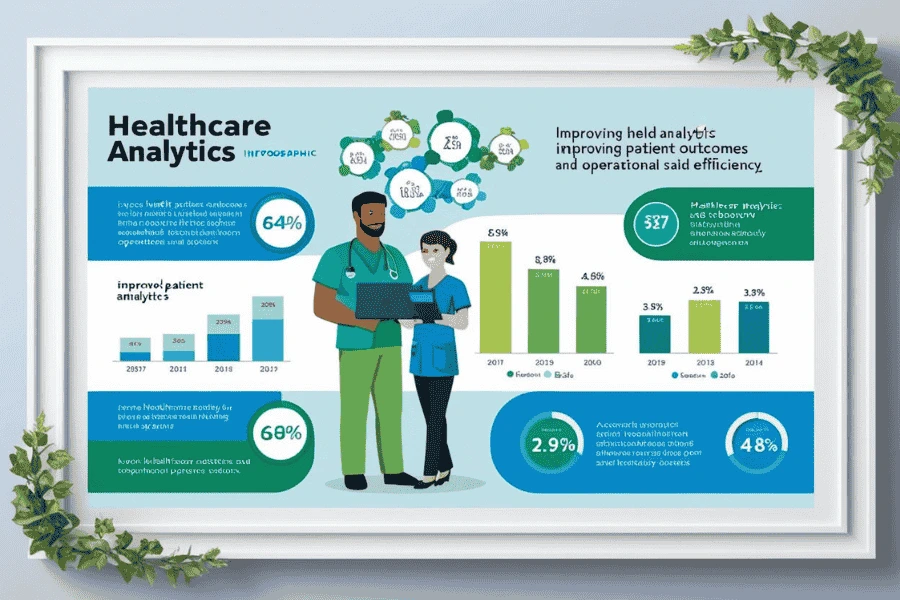How Data Analytics Drives Innovations in Education
Introduction
In the rapidly evolving world of healthcare, organizations are increasingly relying on healthcare data analysis to guide informed decision-making. The growing availability of medical data analytics allows providers to transform raw information into actionable insights. This not only improves the patient experience but also supports predictive healthcare analytics strategies designed to enhance both patient outcomes and operational healthcare efficiency.

What is Healthcare Analytics?
At its core, healthcare analytics involves gathering, processing, and analyzing vast amounts of patient health data and clinical information to support better healthcare delivery. By utilizing electronic medical insights and advanced clinical analytics tools, healthcare professionals can detect trends and patterns that improve treatment decisions. Tools like real-time health monitoring provide ongoing data that further optimize care management and operational workflows.
Improving Patient Outcomes
Healthcare analytics is key to refining patient outcome metrics. Through predictive healthcare analytics, providers can identify individuals at risk for chronic diseases, allowing early intervention. Technologies such as clinical decision support tools guide clinicians in making safer and more effective treatment choices. Additionally, the rise of personalized medicine allows treatments tailored to the individual, backed by insights from population health dashboards that track health trends across groups.
Driving Operational Efficiency
Analytics also plays a crucial role in streamlining healthcare operations. Techniques such as hospital workflow optimization help predict patient volumes, improve staff scheduling, and maximize resource use. By focusing on cost reduction in hospitals, healthcare facilities can eliminate waste and inefficiencies. Analyzing the patient journey enables the reduction of bottlenecks, leading to better throughput and a smoother patient experience overall.
Real-World Applications
Leading health systems demonstrate the power of analytics daily. From reduced readmission rates using predictive healthcare analytics to improved surgical scheduling through digital transformation in healthcare, these innovations enhance both care quality and efficiency. Examples like the Cleveland Clinic and Kaiser Permanente highlight how real-time data can drive better population health management.
Overcoming Challenges
Despite its potential, healthcare analytics faces hurdles. Integrating diverse data systems and safeguarding patient health data privacy are ongoing challenges. Additionally, fostering a culture that embraces data-driven practices requires training and leadership commitment. The accuracy of insights depends heavily on consistent, high-quality data collection and management.
The Future of Healthcare Analytics
The future is bright with innovations such as AI in healthcare analytics and machine learning in hospitals poised to revolutionize care. These technologies will enhance predictive accuracy and enable smarter diagnostics. Leveraging big data in healthcare will help create more personalized, efficient, and proactive care models. Coupled with remote patient monitoring data, providers will have unprecedented tools to improve health outcomes and operational performance.
Conclusion
Healthcare analytics is transforming healthcare delivery by providing actionable, data-driven insights that improve patient health and optimize operations. Embracing this digital evolution will empower healthcare organizations to stay ahead in quality care while managing costs effectively. Prioritizing health trends, clinical data improvement, and patient well-being will ensure the future of healthcare is smarter and more compassionate.
Active Events
Maximizing Your Earnings: 7 Strategies for Business Analysts in 2024
Date: Aug 07, 2025 | 7:00 PM (IST)
7:00 PM (IST) - 8:10 PM (IST)
2753 people have registered
Data Scientist Challenges One Should Avoid
Date: August 14, 2024 | 7:00 PM (IST)
7:00 PM (IST) - 8:10 PM (IST)
2753 people have registered
Bootcamps
Data Analyst Bootcamp
- Duration:8 weeks
- Start Date:October 5, 2024
Digital Marketing Bootcamp
- Duration:8 weeks
- Start Date:October 5, 2024
